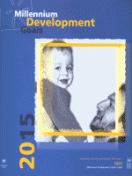UNDP - HUMAN DEVELOPMENT REPORT 2003 - BOSNIA and HERZEGOVINA
UNDP - HUMAN DEVELOPMENT REPORT 2003 - BOSNIA and HERZEGOVINA
Contributor(s): Armin Sirčo (Editor), Žarko Papić (Editor), Milena Marić (Translator), Tamara Koren (Illustrator)
Subject(s): Politics, Civil Society, Governance, Public Administration, Sociology
Published by: UNDP United Nations Development Programme
Summary/Abstract: Bosnia and Herzegovina is facing a turning point. After the destruction of the 1992-1995 war and the subsequent, massive international reconstruction support, the country now finds itself at a crossroads between economic, social and political dependency on one side and the sustainability and local ownership of its development on the other. The Human Development/Millennium Development Goals Report for Bosnia and Herzegovina for the year 2003 is forward-looking and proposes policies in specific sectors that will help achieving sustainability and ownership. It also contains quantitative forecasts for the implementation of the Millennium Development Goals (MDGs) by 2015. // The MDGs are of critical importance for BiH. They provide a global context that determines previously under appreciated aspects of the globalisation process, especially with regards to poverty reduction, the humanisation of development, and the advancement of development aid. With this report and by implementing its recommendations and policies, BiH is actively joining the globalisation process, especially the activities of UN agencies and the UNDP in particular. One may argue that MDGs as such cannot be all that relevant for BiH context as the global goals have been defined too generically and detached from the present day of BiH. There also might be voices to express discontent with irrelevance of AIDS or maternal mortality, for example, in the country where these are not policy priorities. Yet, the question is - what BiH can do to prevent them from becoming issues before too late, and what real priorities the country can set in such areas as health, education and economy, outlined in MDGs. // Some statistics provide an optimistic, but perhaps misleading development picture of BiH, in light of global generic MDGs. Primary education rates stand far much higher than most of the developing countries, while maternal mortality figures are not high1. Yet, such a status quo is rather an inheritance from former socialist system. Unless the country embarks on the implementation of the mid and long-term development strategy, such achievements cannot be taken for granted forever given a current fragile economic outlook and insufficiency of public revenues. Furthermore, this report takes a look at disaggregated data to capture who are the vulnerable and neglected groups, and who would be the potential vulnerable ones, all of which should be taken into account when BiH governments and CSOs formulate development policies and implementhem in line with 8 ambitious MDGs.
MDG 1 on poverty reduction seems to be a main challenge of BiH today, but it cannot be addressed in isolation of other MDGs as poverty reduction requires integrated and multisectoral approach that cannot be carried out if other MDGs are left aside. In other words, it would be myopic to formulate poverty reduction policies without taking education, health and environmental factors as relevant variables in an integrated manner. Goal 8 (on international cooperation) is also of utmost importance as it should enlighten the international community how to better address internally identified development priorities in BiH especially at a time when external financial support is on decline. // Therefore, this Human Development Report on MDGs attempts to assess problems, set priorities, and identify solutions along with BiH specific development indicators and benchmarks for all 8 goals. The report thus should enable governments and civil society organizations together to implement, monitor and evaluate country specific MDGs.
Series: UNDP - HUMAN DEVELOPMENT REPORTS
- Page Count: 141
- Publication Year: 2003
- Language: English
- Content File-PDF
- Introduction

